
Miquéla V. Thornton, The Cap Times, June 6, 2024
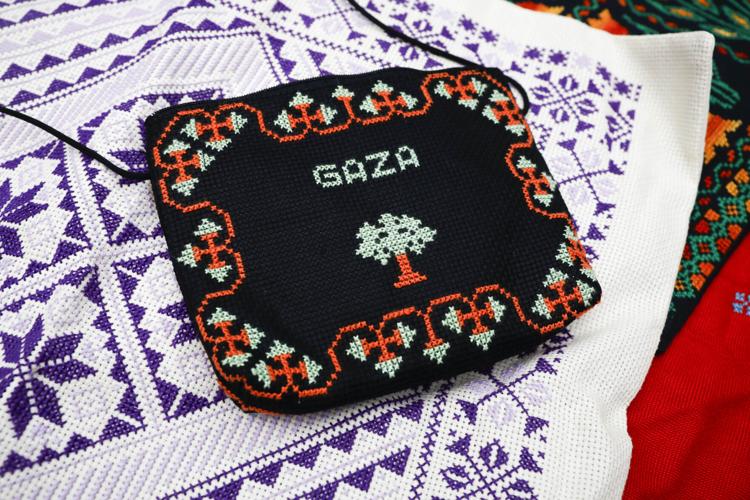
When Laila Hasan thinks back to the first time she engaged in the traditional Palestinian embroidery technique of tatreez, she recalls being 7 years old and learning the skill from her mother, who told her, simply, “Laila, if you want to be strong, you have to be more independent.”
“If you feel like you have a bad life or no one can help you, you can help yourself by your hand,” her mother told her.
Hasan, a textile artist visiting Madison on Sunday from the West Bank, went on to make money embroidering dresses, or thoubs, stylized by the tatreez technique. Born in 1961, she kept dress-making until she became one of the first women shopkeepers in the “Old City” of Jerusalem in 1995 and founded an embroidery and jewelry-making collective 10 years later.
Passed down from mother to daughter for centuries, tatreez uses threads to weave stories by cross-stitch, representing distinct landscapes of Palestinian regions, earning it a spot on a UN list intended to protect things intangible to cultural heritage.
Now, with more than 150 stitchers, Hasan’s organization, Women In Hebron, aims to give women in the Hebron/Al-Khalil Old Town of the West Bank a means to earn income with their craft.
“There’s so much knowledge and history and culture that’s inside those embroidery patterns that represent plants and animals and aspects of life on that land for those people for so many generations,” said Cassandra Dixon, founder of the Madison-based organization Palestine Partners, which is sponsoring Hasan’s trip to Madison.
Sawr cypress tree motifs, for example, don Nawal’s zippered pouches; intricate symbols of cloves and carnations pattern Women In Hebron’s scarves and shawls; olive trees representing Gaza adorn coin purses; red eyes of cows peer from wallets; and cross-stitches of chicken’s feet borders, feathers and geometric Moons of Bethlehem tell the story of Hebron on pillowcases.
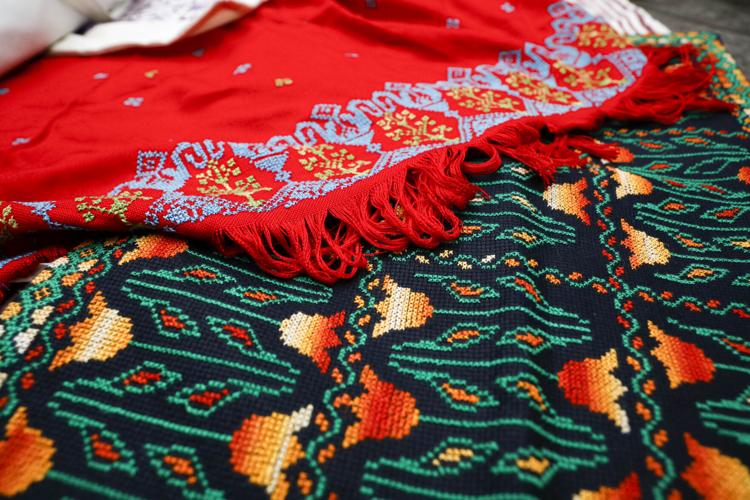
“Tatreez is now a part of my heart,” said Hasan, who draws many of the designs herself for the women to poke their needles through. “When I’m sleeping, believe me, I’m dreaming and I make a new design.”
Hasan’s goal of local employment is heightened as Israel’s suspension of more than 110,000 Palestinian work permits put many of the region’s men out of work, and displacement is exacerbated by the Israeli military’s latest attack on Rafah.
Women In Hebron also seeks to rely less on humanitarian aid, which can make Palestinian organizations vulnerable when donor countries freeze funding in response to incidents such as the Hamas attack on Israeli citizens in October.
“What they really want is what we all want: access to employment and to earn a living for ourselves and supporting ourselves and our families and whoever it is that’s dear to us,” said Dixon. “That’s a human longing.”
Through the Madison-Rafah Sister City Project and a sponsorship by Palestine Partners, Hasan is visiting Madison as she travels to multiple U.S. cities, sharing the stories of the women embroiders of Hebron. She will be at the Madison Quaker Meeting House on Sunday to talk about the lives of the women who made the items and life under Israeli occupation.
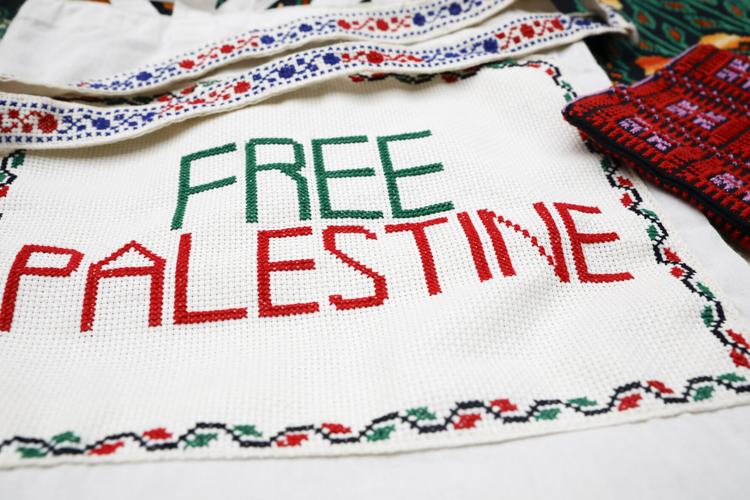
The Madison-Rafah Sister City Project was founded in 2003, and Hasan’s visit is its latest effort of a cultural exchange following the city of Madison’s narrow rejection of official Sister City status in 2004.
Finding access to customers
According to Dixon, Israel’s control over who comes into and leaves Palestine makes sustaining the unofficial sister city relationship difficult. Hasan was able to get her first visa in 2016. “It was very easy in that moment,” said Hasan, because the government wasn’t worried about “an old lady traveling.”
Nevertheless, because of her visa status, she can’t sell the products in person in the U.S. That’s one reason Dixon, who first visited the region in 2006, founded Palestine Partners: to make it easier for people in the U.S. to support those in the West Bank, especially artisans, through online purchases.
“There’s not access to something like Etsy or eBay or marketing platforms that will work for people,” said Dixon, who has taken several humanitarian trips to the West Bank. She met Hasan on one of those trips and they became close friends. The support of her friends in the U.S., like Dixon, is what Hasan says keeps her going amid what a U.N. rights expert calls a crime of genocide.
Additionally, Dixon said, “there’s not access to a U.S. or a European audience,” which is crucial for artisans as Palestinians cannot afford to buy their crafts amid the war, and the area, dependent on tourism, is diminished not only because of the current violence but also the “road closures, checkpoints, settler incursions and unrest in general,” that rules everyday life, said Dixon.
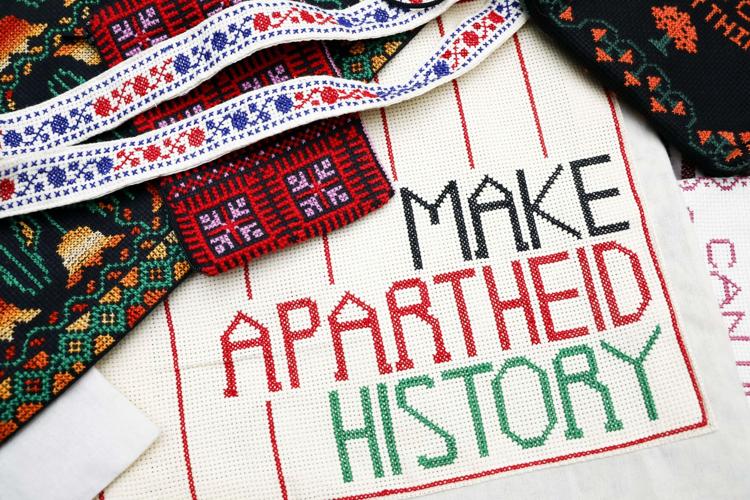
Americans ‘don’t have to think about killing’
Hasan spoke of the deep sadness she feels as she visits American cities.
“I’m happy to be here, but I cannot enjoy my time. I keep thinking about my people,” she said. “People here are protesting for Palestine, but at the end of the day, they go home and they can do what they want.”
“In America, you have a different situation than we have,” said the textile artist. “You don’t have to think about occupation. You don’t have to think about the waters.”
The collective’s jewelry is intended to raise money for a water cistern because, according to Palestine Partners, Israel has “seized control of the Palestinian aquifer” to supply Israeli settlers, leaving villagers to fall ill due to contamination.
“You don’t have to think about checkpoints here or here,” Hasan added. “You don’t have to think about (the U.S. government’s role in) killing without helping, without (giving) food or water.”
She referred to the fact that U.S. funding for Israel has reached historic highs as an estimated 37,500 people were killed since Oct. 7. The 12,300 Palestinian children who have died, according to a U.N. agency report, are more than have been killed in all world conflicts over the past four years.
Hasan grew up amid the Six Day War, which erupted just before she first learned to thread a needle, and later, the Yom Kippur War of the 1970s. Hasan said that in her 63 years, “we never had this bad a situation before. It’s just come after October 7, (but) this is nothing new.”
“If you go to the village, I mean every house in the village, you can have a story from the occupation,” said Hasan, who relayed stories of her own cousins killed, people murdered during the day by burning, or by bulldozer, of thousands arrested in the West Bank and multitudes more missing.
Around the time she learned tatreez, she said, Hasan remembers what type of food her mom was carrying as they ran away from their village to a mountain and watched as Israelis “tore down the village in front of us.”
“They got support from countries. … I can see your country is the first one to support.” While in the United States, Hasan avoids buying even things she needs for fear the American taxes will help “kill people.”
“I want to be honest with you,” Hasan told the Cap Times, “people, they hate even the name of America. Many, they hate because — and (by America) we talk about the government, not the people — if they want to stop the war in one second, they can do that.”
Less than a day after the Cap Times interviewed Hasan, the Biden administration unveiled a cease-fire plan to which it believes Israel will agree. Israeli Prime Minister Benjamin Netanyahu, however, called it a “nonstarter.”
‘I want to talk with people’ in Madison
Since the creation of Israel in 1948, tatreez has emerged as a symbol of resistance, from seamstresses stitching black, white, green and red after Israel’s ban of the Palestinian flag following the Six Day War, to the Women In Hebron lettering “Free Palestine,” “Women Can Do Anything,” and “Make Apartheid History” on their garments today. Other resistance symbology like the Handala character, the keys of return and maps of their homeland are charms on the organization’s jewelry.
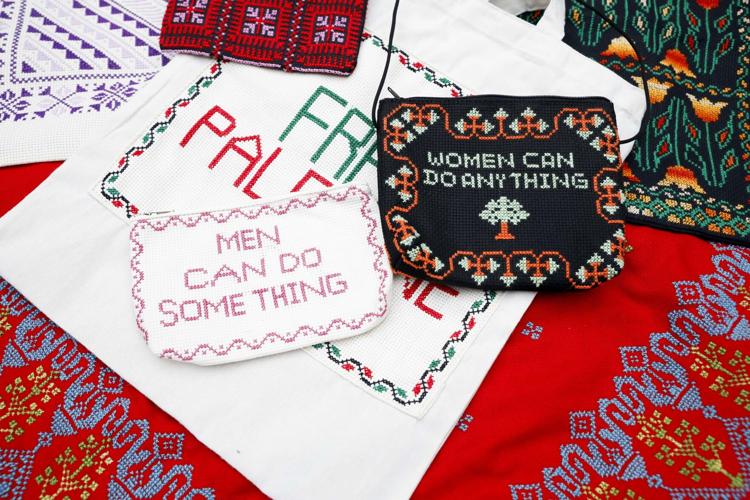
Among its programming, Palestine Partners will host a silent art auction at the end of June and a bike ride event July 21 to raise money for the Middle East Children’s Alliance. Dixon encourages people to engage with their elected officials, but “I am still making calls most days to (Sen. Tammy) Baldwin’s and (Sen. Ron) Johnson’s office,” she said. “And it can begin to seem frustrating.”
Hasan, a mother of six, said that once she arrives in Madison, “I want to talk with people” and ask them, if they were in a Palestinian territory, “Can you carry all these problems? Can you go away from your family when they need you? Can you answer your children if they ask you why … why they are burning the people alive … why are they bombing? Why you are without water? Why you can’t have normal again?”
While here, she will laugh and smile, she said, but people won’t know what she has “in her heart.” She will avoid crying to elude perceptions of weakness, adhering to her mother’s advice to be strong.
“Let me give you all the things I went through,” Hasan said, “And then let me know what you can do if you’re here instead of me.”
Miquéla Thornton is the David Maraniss Fellow for the Cap Times and is pursuing her master’s degree from the University of Wisconsin-Madison School of Journalism and Mass Communication. She received her bachelor’s in creative writing and science and technology communication from Vanderbilt University.
To support our local journalism, become a Cap Times member.
Leave a Reply
You must be logged in to post a comment.